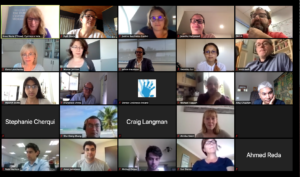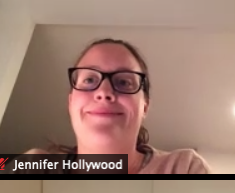Report from the Virtual 6th Annual Dublin Cystinosis Workshop 2020
After the incredibly successful Cystinosis Network Europe’s Virtual International Cystinosis Conference which was held online in April of this year, Cystinosis Ireland was delighted to host the 6th Annual Dublin Cystinosis Workshop 2020 virtually on 16 July 2020.
Unlike the International Cystinosis Conference which is family-focused, the Dublin Cystinosis Workshop is a specialist scientifically focused meeting aimed at the scientists, clinicians healthcare professionals and patient experts in the field of cystinosis treatment and research.
Despite Covid 19 bringing the world of in-person meetings to a halt, the Virtual 6th Annual Dublin Cystinosis Workshop 2020 welcomed our largest ever participant audience of 49 experts from 10 countries (Belgium, Netherlands, France, Italy, Germany, Ireland, UK, USA, Canada and New Zealand) to share recent advances in their respective research endeavours and to look at new ways to develop our understanding of cystinosis as a disease and its treatment.
Mr Mick Swift, Chairman of Cystinosis Ireland welcomed all of the participants to the meeting and reflected on the importance of maintaining links and the exchange of research advances during Covid 19 pandemic. The virtual Zoom meeting was ably co-chaired by long time champions of Cystinosis Ireland – Dr Patrick Harrison, Department of Physiology at UCC and Professor Elena Levtchenko, Professor of Pediatrics, UZ Leuven.
The workshop programme itself comprised five keynote speakers with a further 15 speakers delivering short research communiques.
The excellent keynote speakers were from (i) Dr Rik Gijsbers, Associate Professor in the Faculty of Medicine and Head of the Subdivision Viral Vector Technology and Gene Therapy, at KU Leuven, Belgium who provided a timely overview of the two types of viral vectors systems currently being used to deliver genetic material into a patient’s cells; (ii) Professor Michael Taggart, Chair of Reproductive Sciences, at the Cardiovascular Research Centre, Newcastle University, UK, who delivered a very interesting presentation that considered the potential for cystinosis patients to develop cardiovascular problems in later life; (iii) Professor Francesco Emma, Head of the Department of Pediatric Subspecialties, Ospedale Pediatrico Bambino Gesù, Rome, Italy and (iv) Dr Manoe Janssen, Assistant Professor, Department of Pharmaceutical Sciences, Utrecht University, both of whom gave presentations on the search for new and more effective drug therapies for cystinosis; and (v) Professor Maya Doyle Associate Professor of Social Work, School of Health Sciences & Clinical Assistant Professor, Frank H. Netter MD School of Medicine, Quinnipiac University, USA and her co-contributors Ms Cheryl Simeons and Ms Karen Gledhill, who spoke about the need to hear the voice of the patient and their experiences establishing the Adult Leadership Advisory Board (of the US Cystinosis Research Network), a forum for the cystinosis community to gain new perspectives and better navigate their unknown future by promoting honest and transparent dialogue about the challenges and negative aspects of the disease, while highlighting the positives.
Cystinosis Ireland was particularly grateful to Professor Emma for joining the workshop despite the immense workload pressures that he and his medical colleagues are experiencing in Italy due to the impact of Covid 19.
The short communications were given by Dr Jennifer Hollywood, from the University of Auckland who presented her research on mTor inhibition in cystinotic isogenic pluripotent stem cells (iPSC) and the characterisation of an important new rat model to study cystinosis (which was supported in part by a Cystinosis Ireland Seedcorn Grant); Dr Shu-Dong Zhang, principal investigator and senior lecturer at the Northern Ireland Centre for Stratified Medicine, University of Ulster, C-TRIC, Derry/Londonderry who presented his work on using gene expression connectivity mapping to screen a database of over 1,000 FDA approved drugs in order to identify potential new therapies for cystinosis; Dr Koenraad Veys, pediatrician and researcher at the Department of Pediatrics at UZ Leuven, Belgium who described a retrospective study on a cohort of cystinosis siblings to determine the impact of commencing cysteamine treatment early in the life of the patient on the progression kidney disease and other aspects of the cystinosis disease; Dr Aude Servais, senior nephrologist at the Necker Hospital in Paris, France, also presented on RaDiCo-ECYSCO – a multi-centre European cystinosis retrospective and prospective cohort of cystinosis patients; Dr Brendan Keating, principal investigator at Penn Transplant Institute, University of Pennsylvania, USA who explained the plans of the iGeneTRAiN consortium to conduct genome wide genotyping and whole exome sequencing of all available cystinosis patients worldwide; Dr Swastika Sur from the Sarwal Group, Department of Surgery, University of California San Francisco, USA, presented on her recent research findings on the potential role of the vacuolar ATPase gene family in kidney function and the male reproductive system in cystinosis, and Professor Justine Bacchetta from the Centre de Référence des Maladies Rénales Rares, Centre de Référence des Maladies Rares du Calcium et du Phosphore, at the Hôpital Femme Mère Enfant in Bron, and from the INSERM 1033 Research Unit in Lyon, France, who spoke about a research study CYSTEABONE which is focused on understanding the specific genetic factors and therapeutic regimes and their impact on bones in cystinosis patients.
This year’s Dublin Cystinosis Workshop also strongly encouraged early-stage researchers to present their latest research findings. Postgraduate researchers Dries David, KU Leuven; Amer Jamalpoor, Utrecht University; Fatima Tokhmafashan, McGill University; Annika Ewart, Hannover Medical School, and Meisha Khan, UCSD, all presented their current research at the workshop.
We particularly welcomed Amer Jamalpoor, the recipient of the first Professor Roz Anderson Memorial Prize for best scientific poster and also of the Cystinosis Ireland Prize for best lay-oriented oral presentation at the 5th Annual Dublin Cystinosis Workshop 2019, who was specifically invited to present on his research. Amer presentation focused on understanding the link between the cell’s TCA cycle (i.e. the tricarboxylic acid cycle or the Krebs cycle – the pathway used by all aerobic organisms to release energy from carbohydrates, fats, and proteins). α-ketoglutarate, a key metabolite produced in the TCA cycle was found to be affected in cystinotic cells. Bicalutamide, a registered drug molecule, was identified as a potential therapy for cystinosis. Amer demonstrated that bicalutamide had potential to restore α-ketoglutarate and to correct proximal tubule phenotype in nephropathic cystinosis when used in combination with cysteamine. The cysteamine-bicalutamide combination treatment was found to reduce cystine levels more than cysteamine alone, restored part of the abnormal metabolome and proteome in cystinotic cells and improved lysosomal degradation and autophagic flux, showing potential as a future therapeutic agent for cystinosis.[1]
A particular focus of this year’s Dublin Cystinosis Workshop was on the role of the patient voice both in directing their lives, their treatment, management of their disease and as partners in the research process – ‘nothing about us, without us’. In addition to the keynote contributions of Professor Doyle, Ms Simeons and Ms Gledhill, Ms Anne Marie O’Dowd Cystinosis Ireland Executive Member and Chair of the Worldwide Cystinosis Community Advisory Board, emphasised the importance of patient experts input into the design, planning and execution of all research projects from basic science through to clinical trials. Ms O’Dowd emphasised to the audience that public and patient involvement (PPI) is no longer an optional extra when applying for research funding, it now influences whether or not a research proposal will be funded or not.
[1] Jamalpoor, A. et al. (2020) Cysteamine-bicalutamide combination treatment restores alpha-ketoglutarate and corrects proximal tubule phenotype in cystinosis (preprint) doi: https://doi.org/10.1101/2020.02.10.941799
Dr Jennifer Hollywood wins the 2020 Professor Roz Anderson Memorial Prize for best short communication at the 6th Annual Dublin Cystinosis Workshop 2020
We are proud to announce that Dr Jennifer Hollywood won this year’s Professor Roz Anderson Memorial Prize which was awarded for the best short communication presented at the workshop. Dr Hollywood was awarded the prize following a direct poll of her scientific peers participating in the workshop.
We in Cystinosis Ireland are delighted that Dr Hollywood won this year’s award and feel that Dr Hollywood was a particularly worthy recipient not just for her excellent presentation but also for her dedication in participating all through the night right to the end of the workshop.
The Professor Roz Anderson Memorial Prize is awarded in recognition of the immense scientific contributions to the field of cystinosis research made by the late Professor Roz Anderson, University of Sunderland. The Professor Roz Anderson Memorial Prize is €200 cash award and an invitation to present at the next annual Dublin Cystinosis Workshop.
Acknowledgements
Hosting the Virtual 6th Annual Dublin Cystinosis Workshop 2020 would not be possible without the hard work and assistance of very many people who regularly step up to the plate to help us out.
In particular, Cystinosis Ireland would like to thank the members of the Dublin Cystinosis Workshop Scientific Organising Committee – Dr Paddy Harrison (Chairperson), Dr Atif Awan (Irish Medical Organiser), Professor Elena Levtchenko, Dr Achim Treumann, Dr Thomas J. McDonald and Ms Anne Marie O’Dowd who give their time and expertise freely and generously.
Sincere thanks also to Ms Denise Dunne and Dr Ruth Davis for all their hard work in organising this event.
A particular note of thanks must also go to Dr Harrison and Professor Levtchenko, both of whom were fantastic chairpersons throughout the workshop, maintaining good order and promoting excellent discussions among the participants.


